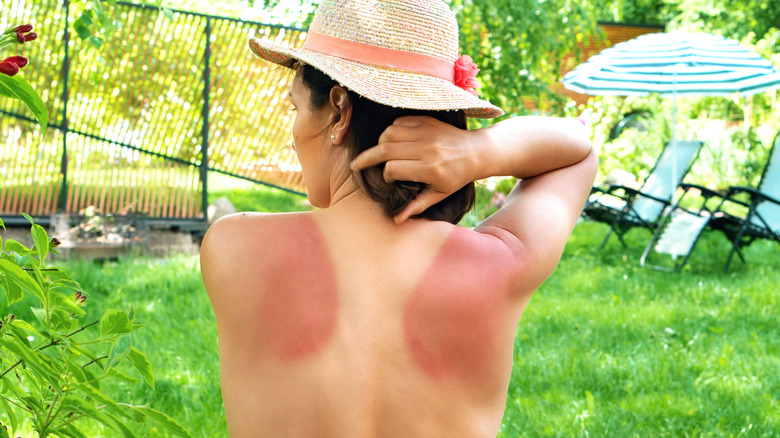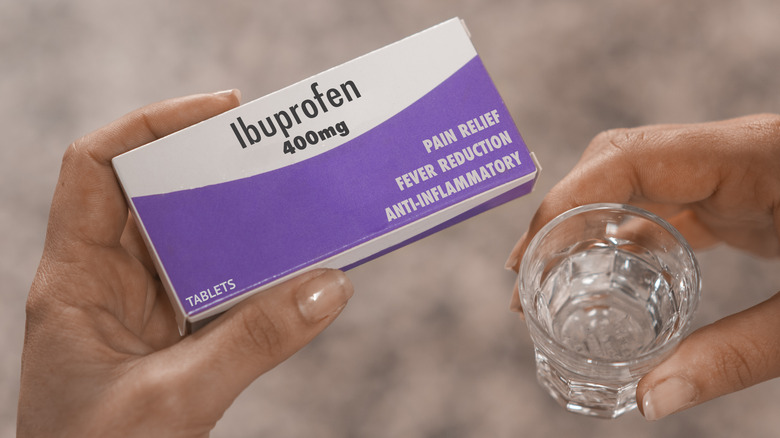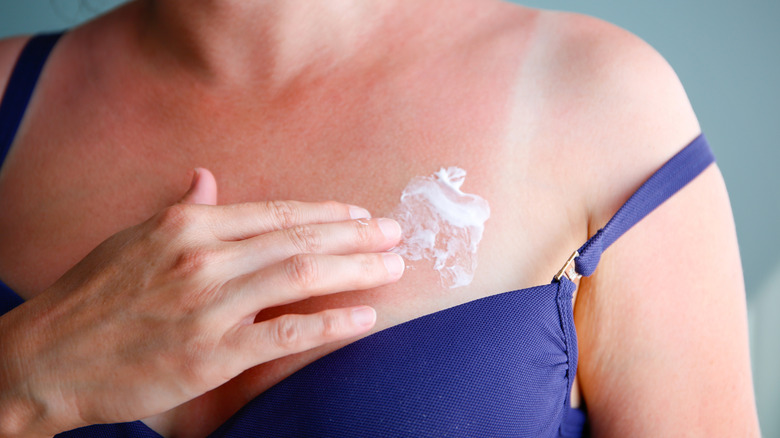Should You Take Ibuprofen After Getting A Bad Sunburn? Here's What We Know
A sunburn occurs when you are exposed to ultraviolet (UV) radiation. Summertime usually calls for plenty of time spent outdoors, and it is easy to think that sunburns are only about the reddening of your skin with some peeling that comes after. However, sunburns can be quite severe, depending on how deeply your skin has been damaged by UV rays.
Typically, a sunburn can either be first degree or second degree. There are also rarer cases of third degree sunburns. While a first degree sunburn affects the outer layer of your skin and causes symptoms like redness, tightening, warmth, swelling, or blistering of skin, a second degree sunburn could cause deep red marks on your skin and manifest in swelling and blistering over a large area, white discoloration in the burned area, and pain.
Ibuprofen is a non-steroidal anti-inflammatory drug (NSAID), so it can help reduce the inflammatory reaction of your skin and the pain that comes with a bad sunburn. Some cases of sunburn are also accompanied with fevers and headaches. Ibuprofen can help relieve these symptoms too. However, while ibuprofen can be a go-to sunburn remedy for some, it is important to understand its side effects, while also knowing what else you should be doing to treat a sunburn.
Side effects of turning to ibuprofen
The danger with turning to over-the-counter NSAIDs like ibuprofen for sunburn lies in their ease of access, which can make people feel like they don't come with a host of side effects. But experts stress that NSAIDs can have adverse health effects, especially when misused or overused.
While there is no specific data on turning to ibuprofen to treat a sunburn, your gut health suffers when you take ibuprofen every day. Ibuprofen has been associated with gas, bloating, stomach pain, constipation, diarrhea, heartburn, leaky gut, gastrointestinal bleeding, and ulcers. For people with existing gastrointestinal conditions or those with high blood pressure, even limited ibuprofen use could become problematic, per experts. For others, "It's not without risk, but you can feel pretty safe taking it for about three days. Take no more than 400 to 600 milligrams, three times a day, with food. Otherwise, it can ruin your stomach," advised internist Dr. Janet Morgan (via Cleveland Clinic).
Cloudy urine, itching skin, nausea, vomiting, shortness of breath, skin rashes, difficulty breathing, unusual bleeding or bruising, swelling in the face, hands, fingers, legs, feet, or ankles, and weight gain are other common side effects of ibuprofen use. Drugs.com has a more comprehensive list of its uncommon and rare side effects. While those over 50 should avoid the ibuprofen mistake of mixing the drug with other pills they might be on (sunburn or not), some medications that react negatively with ibuprofen include beta-blockers, warfarin, and diuretics. If you're pregnant or breastfeeding, speak with your healthcare provider before you consume the NSAID.
How to handle a bad sunburn (minus ibuprofen)
If you're concerned about ibuprofen use or have a health condition that could be negatively impacted by the use of this NSAID, sunburn-related pain and fever can also be relieved by acetaminophen or paracetamol. But it's important to know that these over-the-counter medications come with side effects too.
That being said, dealing with a bad sunburn requires more effort than popping a pain killer. Firstly, it's important to assess the damage and see if you require a visit to the doctor. While first-degree sunburns can usually be treated at home or with the help of over-the-counter medications, second or third degree burns could warrant a trip to the doctor's office. First degree sunburns should heal within a few days, while second degree sun damage could take several weeks. Hydrating with water, taking a cool shower, and applying a cool compress and moisturizer to the area are other home remedies for treating a sunburn.
If there's severe blistering, fever and chills, dizziness, confusion, exhaustion, muscle cramps, seizures, or slurred speech, this means it's time to visit a hospital. "[Some of these] symptoms can be a sign of severe dehydration, overheating, heatstroke, and/or sunstroke," explained Yale Medicine dermatologist Dr. Amanda Zubek. It is also important to be aware of pre-sun exposure mistakes you're making that will make your sunburn worse. Forgetting SPF protection when you are outdoors is right at the top of the list.


